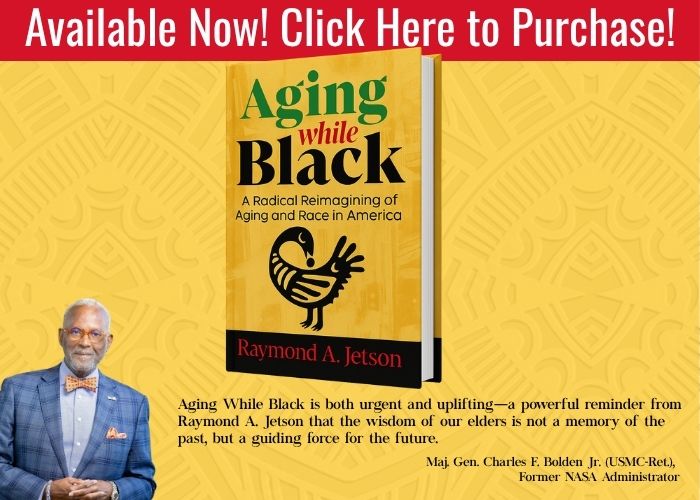We are thrilled to share the second and final part of our conversation with AARP CEO Jo Ann Jenkins. In part 1, we discussed Jenkins’ experience as a dynamic leader in the space, her thoughts on how we strengthen this community and really support Aging Black Americans, and we began to dig into the role AARP plays in that work. The second part continues that important dialogue with topics such as confronting ageism, intergenerational communities, economic challenges and more.
Continue reading, and please, don’t forget to share!
In a 2019 article for Forbes, you wrote about the need to confront ageism and create a more inclusive society that values the contributions of people of all ages. How can AARP combat ageism for adults from marginalized communities?
Through our Diversity, Equity and Inclusion efforts, AARP is raising awareness about ageism and promoting age inclusion in the workplace and in society. For example, even though most corporate leaders see value in having a diverse and multi-generational workforce, less than half of the 6,000 corporations that we surveyed even included age in their DEI policies. We created our Living, Learning, Earning Longer (LLEL) initiative (with the EEOC and the World Economic Forum) to identify best practices and help employers develop and manage a multi-generational workforce. Additionally, AARP’s Employer Pledge Program works with more than 1,800 employers across the country to foster more age-diverse workforces that value experienced workers. We continually advocate to eliminate disparities and systemic factors that negatively impact the diverse communities we serve.
How is AARP promoting intergenerational communities and mutual support between older adults and younger generations, particularly for Black elders and younger people, who may face unique challenges?
If there’s one thing we’ve learned at AARP over the years, it’s that if you want to have a good life when you’re older you have to begin preparing when you’re younger. We are all products of the choices we make throughout our lives. We are engaged in a number of efforts to help connect the generations. One program that has been highly successful is AARP Experience Corps, a community-based volunteer program that empowers people over 50 to serve as tutors to help students become better readers by the end of third grade. It is a proven “triple win,” helping students succeed, older adults thrive, and communities grow stronger. We focus on outcomes, inspiring volunteers to disrupt the cycle of poverty by making a lasting difference in the lives of America’s most vulnerable children.
How is AARP working to expand access to job training programs for older workers, especially those from marginalized communities?
AARP Foundation Senior Community Service Employment Program (SCSEP) is the nation’s oldest program to help low-income, unemployed individuals aged 55+ find work. The program matches eligible older job seekers with local nonprofits and public agencies so they can increase skills and build self-confidence, while earning a modest income. Based on their employment interests and goals, participants may also receive supportive services and skills training through an educational institution that often leads to permanent employment.
Our Back to Work 50+ program provides the know-how needed to land jobs in today’s economy. And our Digital Skills Ready@50+ initiative teaches older adults the foundational digital skills crucial to success in today’s workplace.
We are using our influence and expertise of the 50-plus workforce to make sure employers understand the value of experienced workers. We are leading conversations; tackling age discrimination; and providing tools, ideas, and information to help make them more aware of the value of experienced workers.
How is AARP working to address the financial challenges faced by many Black elders?
The U.S. is facing growing threats to financial wellbeing driven by factors such as drastic reductions in pension plans, uncertainty around Social Security, increased healthcare costs, longer life spans, inability to save, student loan debt, and the shift of savings to shorter-term needs—not to mention the economic impact of COVID-19 and inflation. African Americans—and Black women especially— are disproportionately affected by this. Significant wage gaps due to racial biases and gender disparities have lowered their income earning potential.
A lack of financial- and investment-related education has left Black women unsure about moves they can or should make to boost retirement savings and financial security overall. On top of this, the daily financial pressures of caring for her family and loved ones cause her to put their needs above her own. All this leaves her less prepared for what’s to come in her retirement years. When we look at all these factors together, it’s no surprise that one of the greatest fears about living longer is that we may outlive our money.
At AARP, we believe the time has come to change the conversation—or in many cases, start one—about preparing financially for our later years. We take a holistic approach when it comes to financing our future. Our focus is not just on saving for retirement, but on tracking where our money goes, building emergency funds, coping with financial pressures, protecting our assets and becoming more educated about managing our money.
We offer a wide range of workshops, information and other resources providing practical tips and tools on managing your finances and wellness insights on topics such as Long-Term Care and Caregiving, and, why planning today matters. These are designed not only to help you survive your later years, but also to thrive and be able to afford to live the life you want to live.
Achieving financial wellness can be a challenge for anyone at any age, but it can be especially challenging for those of us in the African American community. But we also know that when we understand what those challenges are and what solutions are available to help us overcome them, we can achieve financial wellness—empowering us to choose how we live as we age.
One other program I would mention is AARP’s Legal Counsel for the Elderly (LCE), which provides free legal and social work services to Washington DC elders in need. LCE has impacted the lives of nearly 10,000 DC residents aged 60-plus with incomes less than 200 percent of the federal poverty level. More than 90 percent of LCE’s clients are people of color. LCE’s efforts yielded more than $20 million in monetary benefits and legal victories for its clients. The main areas of impact include housing, economic security, self-determination, and health and safety.
I’m sure that as a Black woman and national leader with a broad range of experiences and relationships, you have additional thoughts about the challenges and unique opportunities for Black Americans as we age. What questions haven’t been asked? Is there anything else you’d like to add?
Our purpose at AARP is to empower people to choose how they live as they age. As Black Americans, we face a great number of challenges in doing that, and I’ve talked about many of those. But I believe we also now have before us the opportunity to build a more equitable society if only we can grasp it and take advantage of it. This can be a moment when we unite to overcome the disparities that have existed for generations. But we must come together as one to take advantage of the opportunities before us. We thrive when our brothers and sisters thrive.
Sixty years ago, Dr. King stood on the steps of the Lincoln Memorial in Washington, DC and said: “We are now faced with the fact that tomorrow is today. We are confronted with the fierce urgency of now. In this unfolding conundrum of life and history, there “is” such a thing as being too late. This is no time for apathy or complacency. This is a time for vigorous and positive action.” His words still ring true today. This can be the moment where we take the critical next step toward providing all people— regardless of their background—the opportunity to live and age with dignity, purpose and the hope of achieving a healthy and economic secure future.

